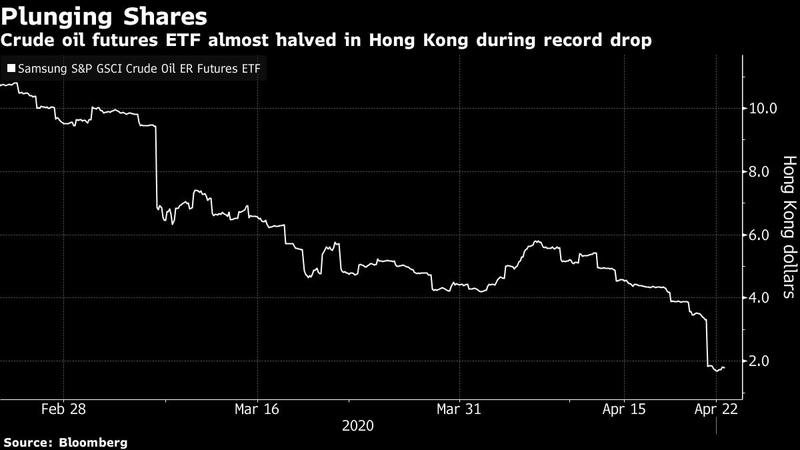 A fuel tanker is seen entering the Vopak Terminal at the Port of Los Angeles, in Wilmington, California, US on April 21, 2020. US crude futures plunged below zero on Monday for first time. (BING GUAN / BLOOMBERG)
A fuel tanker is seen entering the Vopak Terminal at the Port of Los Angeles, in Wilmington, California, US on April 21, 2020. US crude futures plunged below zero on Monday for first time. (BING GUAN / BLOOMBERG)
The unprecedented drop in US oil futures is rippling through the world’s exchange-traded fund market (ETF), with the latest example in Hong Kong.
The Samsung S&P GSCI Crude Oil ER Futures ETF, whose holdings of the derivatives slumped 26 percent on Tuesday to US$378 million, saw its traded units lose half their value for a time Wednesday
The Samsung S&P GSCI Crude Oil ER Futures ETF, whose holdings of the derivatives slumped 26 percent on Tuesday to US$378 million, saw its traded units lose half their value for a time Wednesday. Closing down 46 percent at HK$1.79, the ETF had its biggest drop and lowest finish since trading began in May 2016. Volume was 720 million units, 15 times the three-month daily average, according to data compiled by Bloomberg. There were 1.7 billion units outstanding as of Tuesday, according to an exchange filing Wednesday afternoon.
Samsung Asset Management (Hong Kong) Ltd, which manages the fund, said in a Tuesday exchange filing that the fund will sell its entire holdings of June oil contracts and buy September contracts. It also warned that in a “worst case scenario,” the net asset value of the fund may drop to zero and investors may suffer “a total loss” of their investments.
ALSO READ: Oil rebounds after plunging below zero for 1st time in history
“There is a big tracking error after the ETF switches from tracking June futures to September futures,” said Castor Pang, head of research at Core Pacific-Yamaichi International Hong Kong. “After the switch, the value of the ETF evaporates by more than half because of the plunge in oil futures.”

In the US, the United States Oil Fund, the biggest ETF tracking crude prices, took a series of unusual actions after losing a third of its value in two days. It had to suspend the issuance of new shares, an action that could leave it untethered from prices it’s supposed to track.
ETFs are being rattled because of a quirk in the main US oil benchmark, West Texas Intermediate futures, which requires anyone holding contracts after they expire to be able to take delivery of crude in the oil hub of Cushing, Oklahoma.
READ MORE: Global oil market is broken, drowning in crude nobody needs
Storage tanks there could be completely full by May because of unprecedented lockdown measures to slow the spread of the coronavirus, which have decimated fuel demand. With fewer people able to buy crude and store it, liquidity in near-term contracts could dry up and create squeezes like Monday, when US futures fell to as low as minus US$40 a barrel. So ETFs are spreading their exposure into further-out contracts.



